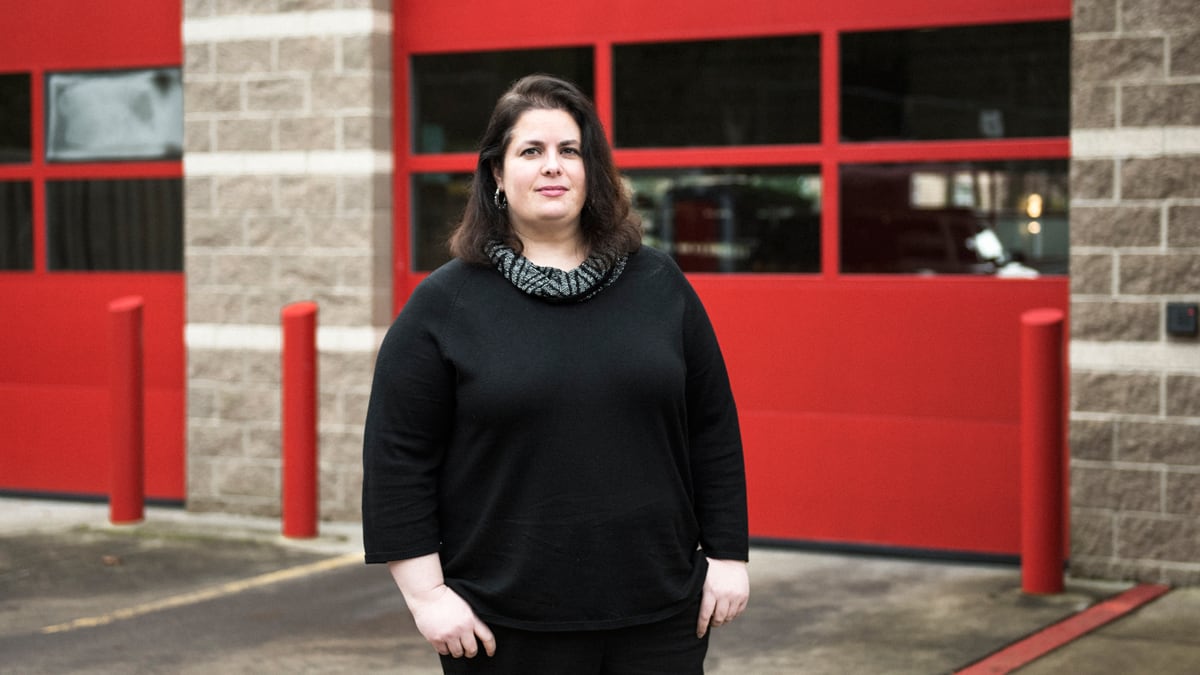This month, Oregonians will vote in the state's first January election in eight years. They can thank state Rep. Julie Parrish (R-West Linn).
Her obstinacy and energy are the forces driving Measure 101, the only item on the ballot. The measure, which seeks to undo a complicated Medicaid funding package state lawmakers cobbled together last spring, is in front of voters because of Parrish.
When Parrish set out to raise 58,000 signatures last summer to put Measure 101 on the ballot, skeptics said she didn't have the money or the know-how to get it done. She gathered nearly 90,000.
"About 80 percent of those signatures were gathered by volunteers," she says. "It was the most humbling, grassroots thing I've ever done."
"You do have to give her credit," says Ben Unger, executive director of Our Oregon, the labor-backed advocacy group. "She worked hard to get it on the ballot and did it all herself."
Parrish claims she's fighting for the little guy, who she says would pay a disproportionate share of the new Medicaid taxes. Measure 101 demonstrates how effective her outsider appeal can be.
Yet observers are puzzled this is the fight Parrish chose. The issue is confusing and could backfire on her. A loss won't burnish her brand. And if Parrish wins, she creates a budget crisis and deprives tens of thousands of the people she professes to cherish of their health insurance.
"Either way," says Kevin Mannix, the state's longtime conservative ballot-measure king, "it's a big risk."
Parrish, 43, regularly confounds people.
The mother of three teenagers and the wife of a retired Army officer, she whirled into the Legislature seven years ago, wearing flip-flops. Her Twitter handle reflects the small business she ran—@hotcouponmama.
She's a Republican from a blue district: Democrats in House District 37 have a voter registration advantage of 7 percentage points. But she's also a maverick who is often at war with her GOP colleagues and says she has attended only two of the House Republicans' weekly caucus meetings since July 2015.
She has a bill to solve every problem, and will happily extol the benefits of her ideas to anybody who'll listen. "She's an idea factory, but her ideas are not all good," says state Rep. Barbara Smith Warner (D-Portland). "And she doesn't listen to what anybody else says about them."
Her brand of in-your-face populism strikes a chord with many Oregonians. And it has made her arguably the most influential Republican in state politics.
Mannix says Republicans could use Parrish more effectively to play good cop, bad cop with Democrats.
"If Republicans looked carefully, they would recognize her as a real benefit to their cause," Mannix says. "I don't see them using her as leverage at all."
In addition to her work as a legislator, Parrish is also a political consultant. in 2016, she ran the long-shot election campaign of former state Rep. Dennis Richardson (R-Central Point) for secretary of state.
Richardson, whose Mormon faith and ultraconservative social views made him a tough sell to blue-state voters, faced Oregon Labor Commissioner Brad Avakian, a Democrat.
Democrats enjoyed a 10-point registration advantage statewide, and the presidential election promised a large turnout. Avakian, a union favorite, raised 50 percent more dollars than Richardson. Yet on Election Day, Richardson trounced Avakian by nearly 80,000 votes, becoming the first Oregon Republican in 14 years to win a statewide election.
Unger and others credit Parrish for the vast improvement Richardson made over his 2014 loss to John Kitzhaber for governor. She sharpened his focus on making government work better as the state's top elections official and auditor.
Parrish has appealed to that same skepticism of government in building support for Measure 101.
She says she gathered signatures to refer Measure 101 to the ballot because she distrusts the Oregon Health Authority, the scandal-plagued agency that administers Medicaid, and because the new taxes are not fair—big, self-insured employers such as Nike wouldn't pay the new Medicaid taxes, while individual insurance policy holders and small employers would.
Parrish rejects criticism that her measure could hurt low-income Oregonians. She says she and her allies have a better, fairer Medicaid funding plan that would plug the budget hole Measure 101's failure would create—although that plan got no traction in the Legislature last year.
Her opponents say she's more interested in building her political consulting and signature-gathering business than in helping others.
For the past two decades, Mannix, former lobbyist Mark Nelson and anti-union crusader Bill Sizemore specialized in gathering signatures for conservative ballot measures. It was a big-money business that sometimes changed laws and always made Democrats play defense. Those three men have retired or reduced their activism, leaving the field wide open.
"It's clear to me that she's going to take the mantle of conservative political consultants," Unger says. "There's a void there that she's trying to fill."
Parrish rejects that assertion, too. She says she's put hundreds of hours into the campaign for free, and notes that her colleague state Rep. Cedric Hayden (R-Roseburg), an oral surgeon, has spent $100,000 on Measure 101.
"I'm $25,000 upside down on this thing," she says. "My husband's not real happy with me."
Instead, Parrish says she's channeling the frustrations of Oregonians who feel left out of the crafting of state policy. She put her cellphone number in the Voters' Pamphlet, and says Oregonians fed up with the status quo call her nonstop.
Win or lose Jan. 23, Parrish says she won't change her approach. "The things I want to fix," she says, "are right here in my backyard."

